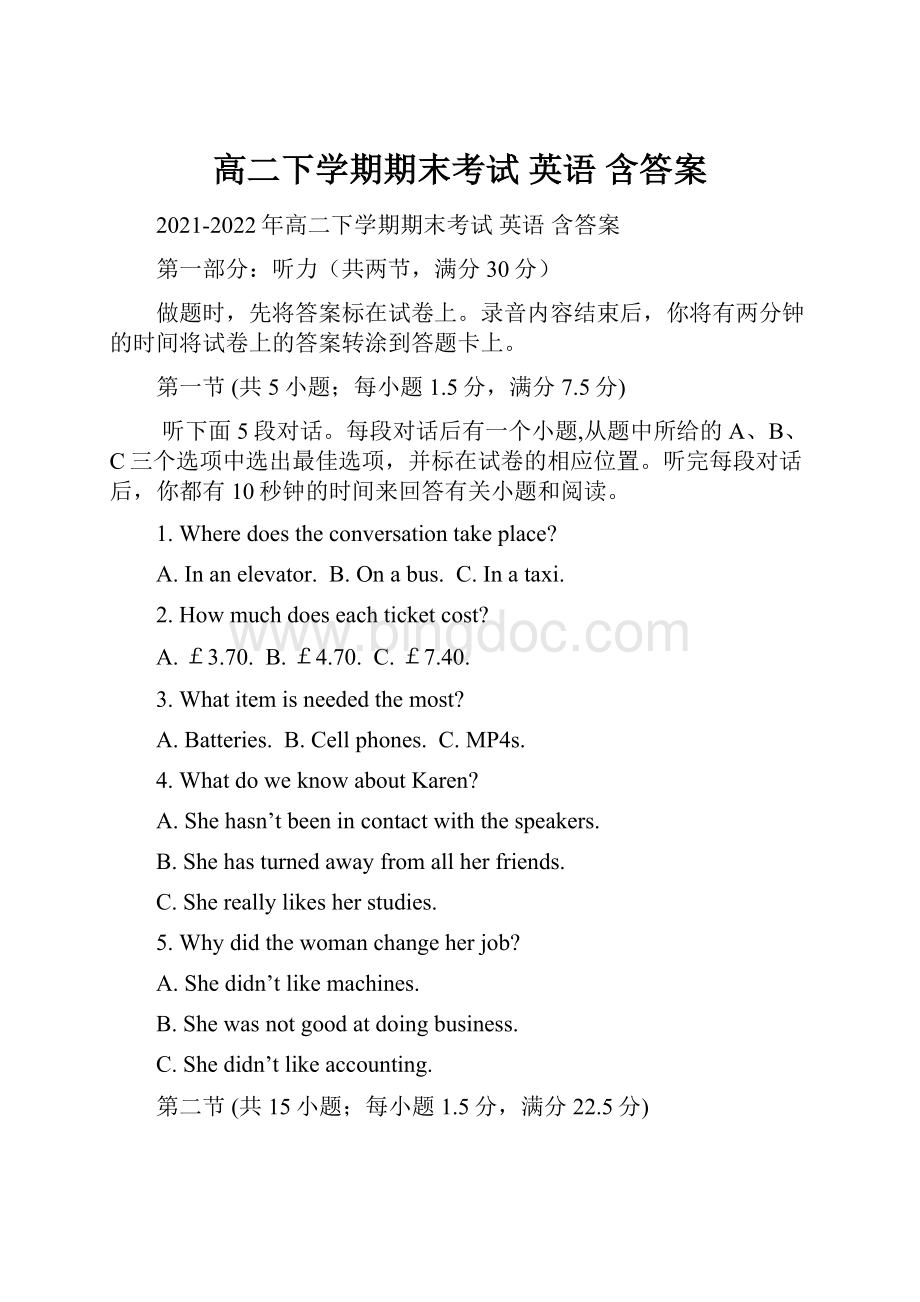高二下学期期末考试 英语 含答案.docx
《高二下学期期末考试 英语 含答案.docx》由会员分享,可在线阅读,更多相关《高二下学期期末考试 英语 含答案.docx(17页珍藏版)》请在冰点文库上搜索。

高二下学期期末考试英语含答案
2021-2022年高二下学期期末考试英语含答案
第一部分:
听力(共两节,满分30分)
做题时,先将答案标在试卷上。
录音内容结束后,你将有两分钟的时间将试卷上的答案转涂到答题卡上。
第一节(共5小题;每小题1.5分,满分7.5分)
听下面5段对话。
每段对话后有一个小题,从题中所给的A、B、C三个选项中选出最佳选项,并标在试卷的相应位置。
听完每段对话后,你都有10秒钟的时间来回答有关小题和阅读。
1.Wheredoestheconversationtakeplace?
A.Inanelevator.B.Onabus.C.Inataxi.
2.Howmuchdoeseachticketcost?
A.£3.70.B.£4.70.C.£7.40.
3.Whatitemisneededthemost?
A.Batteries.B.Cellphones.C.MP4s.
4.WhatdoweknowaboutKaren?
A.Shehasn’tbeenincontactwiththespeakers.
B.Shehasturnedawayfromallherfriends.
C.Shereallylikesherstudies.
5.Whydidthewomanchangeherjob?
A.Shedidn’tlikemachines.
B.Shewasnotgoodatdoingbusiness.
C.Shedidn’tlikeaccounting.
第二节(共15小题;每小题1.5分,满分22.5分)
听下面5段对话或独白,每段对话或独白后有几个小题,从题中所给的A、B、C三个选项中选出最佳选项,并标在试卷的相应位置。
听每段对话或独白前,你将有时间阅读各个小题,每小题5秒钟;听完后,各小题将给出5秒钟的作答时间。
每段对话或独白读两遍。
听第6段材料,回答第6至8题。
6.AtwhattimewillthespeakersgotoseetheSmiths?
A.3:
30.B.4:
00.C.4:
15.
7.Howwilltheygothere?
A.Bybus.B.Bybike.C.Onfoot.
8.Wherewilltheymeet?
A.Atthebusstop.B.Oppositethefactory.C.Infrontofthebookstore.
听第7段材料,回答第9至11题。
9.WhydoesthemanlikeJoplin’s?
A.Becauseofthelocation.
B.Becauseofthebenefits.
C.Becauseofthesalary.
10.Whatdoesthewomansuggest?
A.Heshouldreconsider.
B.Heshouldaskformorebenefits.
C.Heshouldapplyforit.
11.WhyisthewomanfamiliarwithJoplin’s?
A.Herhusbandwasemployedthere.
B.Shelivesnearthere.
C.Sheonceworkedthere.
听第8段材料,回答第12至14题。
12.What’sCharles’problem?
A.Hehastorentaroom.
B.Hehastopaytherent.
C.Hehastoleavehishome.
13.Whatdoweknowaboutthewomaninthepast?
A.Shealwayslentmoneytotheman.
B.Shegotfinancialproblems.
C.Shealwaysboughtlotteries.
14.Howdidthewomangetsomuchmoney?
A.Shewonthelottery.B.Shefoundagoodjob.C.Heruncleleftittoher.
听第9段材料,回答第15至17题。
15.Whatisthewoman’sfirstimpressionofthetelevision?
A.It’stoobig.B.It’sbeautiful.C.It’sofhighquality.
16.HowmuchdidtheTVcosttheman?
A.$1000.B.$1200.C.$2400.
17.Whatdoesthewomansuggestthemando?
A.Watchlesstelevision.
B.Havetheoldtelevisionfixed.
C.Returnthetelevisionandgethismoneyback.
听第10段材料,回答第18至20题。
18.Whatrolesdofathersplaynowadays?
A.Theymainlystayathomelookingafterchildren.
B.Theyworkoutsidethehomeleavingchildcaretotheirwives.
C.Besidesworkingtheyhelpwithchildcareaswell.
19.WhatdopeopleoftendoonMother’sDay?
A.Mothersandchildrengoshoppingtogether.
B.Theyhaveoutdoorpicnics.
C.Theywearcarnations.
20.Whatismostimportantonthesetwodays?
A.Whatchildrenwriteoncards.
B.Thevalueofgifts.
C.Loveandrespectgiventoparents.
笔试部分(满分120分)
第一卷
一、阅读理解(共两节,满分40分)
第一节(共15小题;每小题2分,满分30分)
阅读下面短文,从短文后各题所给的四个选项(A、B、C和D)中,选出可以填入空白的最佳选项,并在答题卡上将该项涂黑。
(A)
Whenitestofriends,Idesirethosewhowillsharemyhappiness,whopossesswingsoftheirownandwhowillflywithme.Iseekfriendswhosequalitiesilluminate(照亮)meandtrainmeupforlove.ItisforthesepeoplethatIreservetheglowinghours,toogoodnottoshare.
WhenIwasintheeighthgrade,Ihadafriend.Wewereshyand“tooserious”aboutourstudieswhenitwasbeingfashionablewithourclassmatestolearnacceptablesocialbehaviors.Wesaidlittleatschool,butshewouldetomyhouseandwewouldsitdownwithpencilsandpaper,andoneofuswouldsay:
“Let’sstartwithatrainwhistletoday.”Wewouldsitquietlytogetherandwriteseparatepoemsorstoriesthatgrewoutofatrainwhistle.Thenwewouldreadthemaloud.Attheendofthatschoolyear,we,too,werechangingintosocialcreaturesandthestoriesandpoemsstopped.
WhenIlivedforatimeinLondon,Ihadafriend,Hewasindespair(失望)andIwasindespair.Butourfriendshipwasbasedontheideaineachofusthatwewouldbesorrylaterifwedidnotexplorethisgreatcitybecausewehadfeltbadatthetime.WemeteverySundayforfiveweeksandfoundmanyexcellentthings.Wewalkeduntilourdespairsdisappearedandthenweparted.WegaveLondontoeachother.
ForalmostfouryearsIhavehadaremarkablefriendwhoseimaginationilluminatesmine.Wewritelonglettersinwhichweoftendiscoverourstrangestselves.Eachofusappears,sometimesinafunnyway,intheother’sdreams.SheandIagreethat,atcertaintimes,weseemtobepartsofthesamemind.Inmymostinterestingmoments,Ioftenthink:
“Yes,Imusttell….”Wehavenevermet.
ItissuchfortingpanionsIwishtokeep.Onebrighthourwiththeirkindisworthmoretomethanthelifetimeservicesofapsychologist(心理学家),whowillonlyfillupthehealing(愈合的)silencenecessarytothosedarkestmomentsinwhichIwouldratherbemyownbestfriend.
1.Intheeighthgrade,whattheauthordidbeforedevelopingpropersocialbehaviorwasto_____.
A.beeseriousaboutherstudyB.gotoherfriend’shouseregularly
C.learnfromherclassmatesatschoolD.sharepoemsandstorieswithherfriend
2.InParagraph3,“WegaveLondontoeachother”probablymeans______.
A.ourexplorationofLondonwasamemorablegifttobothofus
B.wewereunwillingtotearourselvesawayfromLondon
C.ourunpleasantfeelingaboutLondondisappeared
D.wepartedwitheachotherinLondon
3.AccordingtoParagraph4,theauthorandherfriend_______.
A.calleachotherregularlyB.havesimilarpersonalities
C.enjoywritingtoeachotherD.dreamofmeetingeachother
4.Whatisthebesttitleforthepassage?
_______.
A.UnforgettableExperiencesB.RemarkableImagination
C.LifelongFriendshipD.Noblepanions
(B)
Drivingacarisnotjusthandlingcontrolsandjudgingspeedanddistance.Itrequiresyoutopredictwhatotherroaduserswilldoandgetreadytoreacttosomethingunexpected.Whenalcoholisconsumed,itentersyourbloodstreamandactsasadepressant(抑制药),damagingeyesight,judgmentandco-ordination(协调),slowingdownreactiontimeandgreatlyincreasingtheriskofaccidents.Evenbelowthedrinkdrivinglink,drivingwillbeaffected.
Alcoholmaytakeafewminutestobeabsorbedintothebloodstreamandstartactiononthebrain.Absorptionrateisincreasedwhendrinkingonanemptystomachorwhenconsumingdrinksmixedwithfruitjuice.Togetridofalcoholfromthebodyisaveryslowprocessanditisnotpossibletospeeditupwithanymeasuresliketakingashowerorhavingacupofteaorcoffee.
ThepresentRoadTrafficOrdinancestatesclearlythatthelimitofalcoholconcentrationis:
●50milligramsofalcoholper100mlofblood;or
●22microgramsofalcoholper100mlofbreath;or
●67milligramsofalcoholper100mlofurine(尿液).
Driverswhocausetrafficaccidents,orwhomitamovingtrafficoffenceorarebeingsuspected(怀疑)ofdrinkdrivingwillbetested.
Anydriverfounddrinkingbeyondthelimitwillbecharged.ThedriverdeclaredguiltymaybefinedamaximumofHK$25,000andbesentencedtoupto3yearsinprisonandpunishedfor10driving-offencepoints;ortemporarilybannedfromdriving.
Thesamepunishmentappliestofailingtoprovidespecimens(样本)farbreath,bloodorurinetestswithoutgoodexcuse.
Drinkdrivingisacriminaloffence.Bearesponsibledriver,thinkbeforeyoudrink.Forthesafetyofyourselfandotherroadusers,neverdriveafterconsumingalcohol.
5.Thefirstparagraphismainlyabout________.
A.theintroductionofdrivingskillsB.thedamageofdrinkingtoyourbody
C.theeffectofdrinkingondrivingD.theprocessofalcoholbeingabsorbed
6.Theunderlinedword“it”inthesecondparagraphrefersto“________”.
A.alcoholB.absorptionC.bloodD.process
7.WhichofthefollowingisTRUEaccordingtothepassage?
A.Drinkingbelowthedrinkdrivinglimithasnoeffectondriving.
B.Alcoholistakeninmorequicklywhendrunkwithfruitjuice.
C.Havingacupofteahelpstogetridofalcoholfromthebody.
D.50milligramsofalcoholper100mlofbreathisbelowthedrinklimit.
8.Adriversuspectedofdrinkdriving________.
A.shouldprovidespecimensfortesting
B.willbeforbiddentodrivefor3years
C.willbepunishedfor10driving-offencepoints
D.shouldpayamaximumfineofHK$25,000
(C)
AGermanstudysuggeststhatpeoplewhoweretoooptimisticabouttheirfutureactuallyfacedgreaterriskofdisabilityordeathwithin10yearsthanthosepessimists(悲观者)whoexpectedtheirfuturetobeworse.
Thepaper,publishedthisMarchinPsychologyandAging,examinedhealthandwelfaresurveysfromroughly40,000Germansbetweenages18and96.Thesurveyswereconductedeveryyearfrom1993toxx.
Surveyrespondents(受访者)wereaskedtoestimatetheirpresentandfuturelifesatisfactiononascaleof0to10,amongotherquestions.
Theresearchersfoundthatyoungadults(age18to39)routinelyoverestimatedtheirfuturelifesatisfaction,whilemiddle-agedadults(age40to64)moreaccuratelypredictedhowtheywouldfeelinthefuture.Adultsof65andolder,however,werefarmorelikelytounderestimatetheirfuturelifesatisfaction.Notonlydidtheyfeelmoresatisfiedthantheythoughttheywould,theolderpessimistsseemedtosufferalowerratio(比率)ofdisabilityanddeathforthestudyperiod.
“Weobservedthatbeingtoooptimisticinpredictingabetterfuturethanactuallyobservedwasassociatedwithagreaterriskofdisabilityandagreaterriskofdeathwithinthefollowingdecade,”wroteFriederR.Lang,aprofessorattheUniversityofErlangen-Nuremberg.
Langandhiscolleaguesbelievedthatpeoplewhowerepessimisticabouttheirfuturemaybemorecaref